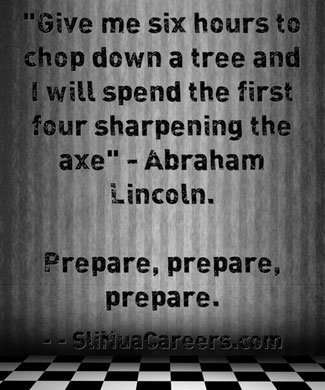12 tips to help you in job interviews
 Claim your successes. Nobody else will do this for you. Yes, you can acknowledge the contribution of your colleagues along the way, but, ultimately, there should be at least as much ‘I’ as ‘we.’
Claim your successes. Nobody else will do this for you. Yes, you can acknowledge the contribution of your colleagues along the way, but, ultimately, there should be at least as much ‘I’ as ‘we.’- An interview is not an elocution test. You’re not being asked to read The News. An ‘um’ here, and an ‘ah’ there, is not a problem. As long as there is a general flow and structure to what you’re saying, the occasional verbal glitch won’t even be noticed.
- Get off the stage – don’t try to find language or a tone of voice you wouldn’t usually use. Don’t search for a posh accent. That will tie you up in knots. Trust your natural communication style.
- In the history of job interviews, not too many (if any) people have gone in and said: “Oh, I see who was in before me – they’re great, give them the job”. Moral of the story: You must sell yourself. No-one else will do it for you.
- It’s a sales transaction. The employer is the buyer. You must know what they want to buy. What are their needs? What will the successful candidate have? What problems will that candidate solve? Then, go in and be that candidate, that solution.
- They wonder if you have any questions for them. What to ask? Ask a question that doesn’t seek to acquire information from them, but rather seeks to transmit further information about you. Tell them one more thing that convinces them you have what they are looking for. But do you know what they’re looking for? That’s where your preparation comes in.
- The interview panel might be anxious too – it could be a different form of anxiety, but it’s a big event for them as well. They are under pressure to get the right candidate. To select the wrong candidate is to lead the organisation into all sorts of peril.
- If you can, learn the name(s) of your interviewers. It builds rapport. Of course, don’t use the name(s) at the end of each and every sentence. That said, if you don’t learn the name(s), don’t hazard a guess.
- ‘Yeah’ should be ‘yes’ and ‘nope’ should be ‘no’. While we fervently believe you shouldn’t construct your contributions in an un-natural way, we are also adamant you must maintain a certain level of formality. Slang is to be avoided.
- If they thank you for turning up, thank them back. When you’re leaving the room, say thanks. Shake hands. Look them in the eye. In other words, be polite.
- Don’t let a discussion on salary distract you from the primary purpose of your being there – namely to show them that you are the best candidate for the job. By all means, have your salary scale at the ready, and mention it if asked to do so without getting into deep negotiations before you’re ready to do so, but their upper limit could be flexible if they really want to fire someone. In the interview, make them want you.
- Don’t bad-mouth previous employers. Even if there is a tricky situation in your past, show that you’re over it now and ready for the next challenge.




